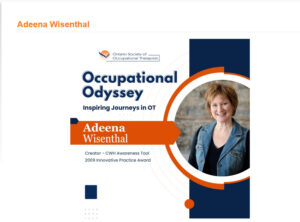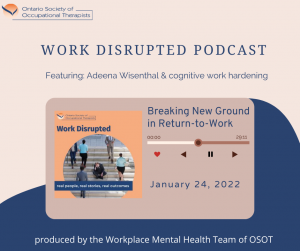Occupational therapists promote energy conservation strategies that reduce the amount of energy to complete a task and that offer a balance between rest and work in order to maximize efficiency.
There are four main energy conservation principles that occupational therapists promote:
- Prioritize which activities are most important/urgent and which need to get done today.
- Plan your day so that you engage in activity/tasks that are more taxing when you have more energy and you are functioning at your best.
- Pace your activities so that you take regular breaks and you break down larger tasks into smaller subtasks.
- Position your body in the most comfortable position which usually means to adhere to good ergonomics.
These principles apply to all areas of one’s life including self-care (e.g., bathing, dressing), kitchen tasks (e.g., cooking, doing dishes, carrying utensils etc.), and household chores (e.g., vacuuming, sweeping, organizing cupboards).
My focus is on the workplace so let’s look at how these principles apply to work:
- Prioritize which work tasks are most important/urgent (Q1) and focus on those. Contain the time spent on less important/less urgent tasks (Q4). Actively reserve time to do the important/non-urgent tasks (Q3) so that they can be worked on and moved forward. Otherwise, such tasks may get pushed out to the point where there is insufficient time to complete them properly which can contribute to work stress. Urgent/non-important tasks (Q2) need attention but contain time spent on them.
The following four quadrants (Q1-Q4) can illustrate this principle:
| IMPORTANT | NOT IMPORTANT | |
| URGENT |
Q1 Complete briefing note by 1:00 pm for manager meeting |
Q2 Complete an employee survey that is due next day |
| NOT URGENT |
Q3 Work on a major proposal that is due in one month |
Q4 Read about the department’s social committee activities |
- Plan your day so that you work on tasks that are more taxing when you have more energy and you are functioning at your best. If you tend to be more alert in the morning then that would be the more ideal time to work on cognitively demanding tasks (e.g., proposals, spread sheets, finances). Choose less demanding tasks (e.g., return phone calls, respond to e-mails) when you are feeling less alert.
- Pace your activities so that you take regular breaks. Contrary to what most people think, taking regular breaks helps you work more efficiently. Taking breaks refreshes the mind, replenishes your mental resources, and can help you be more creative. If you can’t take a break, then consider changing the work task. This strategy can include changing your focus, for example, from a budgeting task to writing a letter. You can also change from working on a solitary task to one that involves consulting with a colleague.
- Position your body so that you are working in a comfortable position which usually means adhering to good ergonomics. This includes good posture, less exertion, fewer awkward movements, better heights and reaches. Improved ergonomics reduces risk of injury, reduces fatigue, and improves work productivity.
Energy conservation is not complicated. It requires a shift in thinking from a constant sustained focus on a task to taking breaks, breaking down a task to smaller subtasks, changing tasks throughout the day, and allotting appropriate amounts of work time consistent with importance/urgency of the task. Making changes to improve office ergonomics typically involves small adaptations which can net large rewards.








